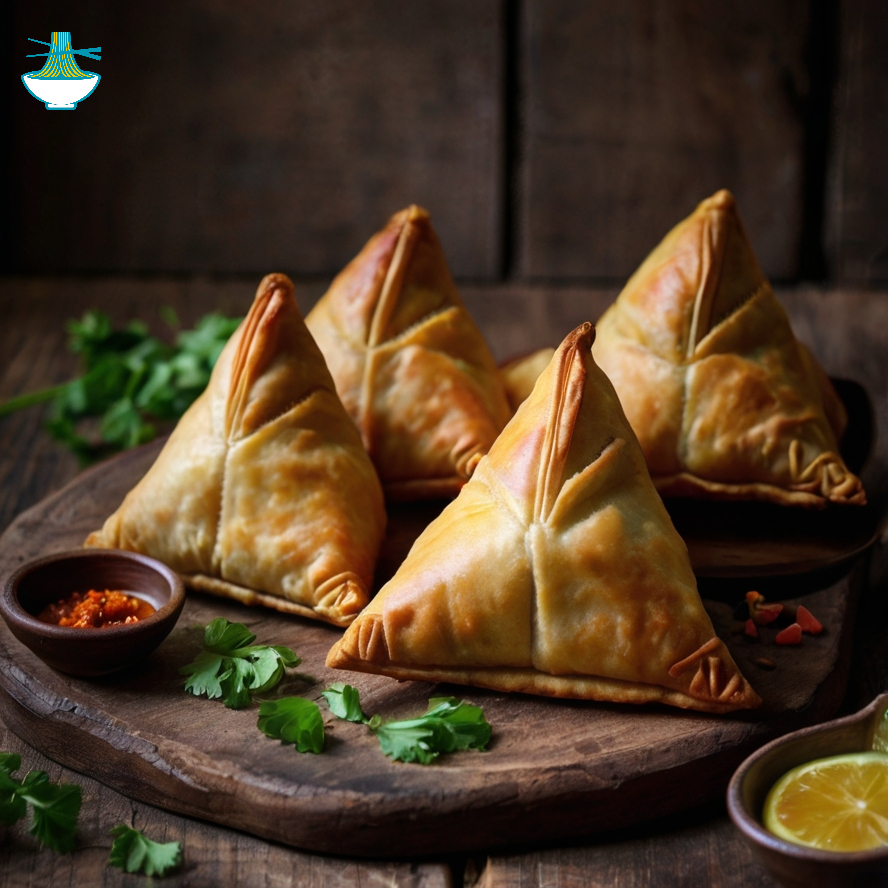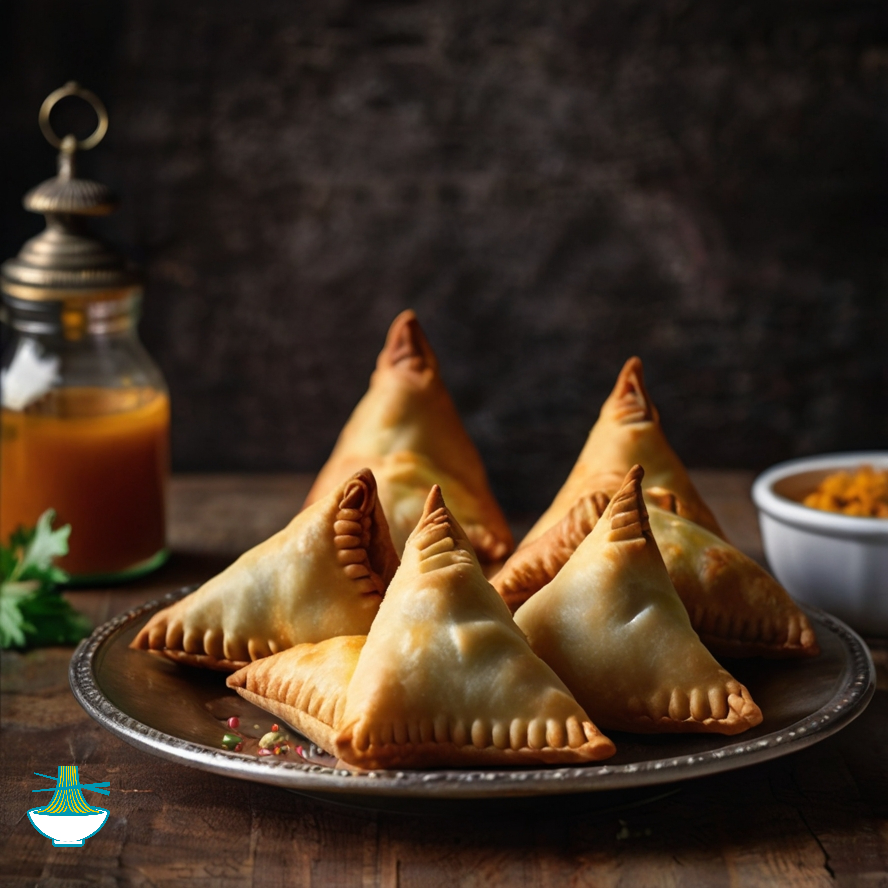Traditional Samosas or Punjabi Potato Samosa are crispy,triangular pastries from the Indian subcontinent,filled with spiced potatoes, peas , and sometimes meat.
The filling is seasoned with a blend of aromatic spices like cumin, coriander, and garam masala, giving samosas their distinctive flavor. After being filled, the pastry is typically fried until golden brown and served hot, often accompanied by chutney or sauces for dipping.
The history of samosas dates back centuries, with origins tracing to Central Asia before spreading to the Indian subcontinent and beyond. Initially, samosas were simple fried dough pockets filled with meat or vegetables, believed to have been introduced to the region by traders and merchants along the ancient Silk Road. Over time, the recipe evolved, incorporating local ingredients and flavors, becoming a beloved staple of Indian, Pakistani, and Middle Eastern cuisines. Today, samosas are enjoyed worldwide, both as a popular street food snack and as a cherished part of festive and everyday meals.
Ingredients:
- 2 cups all-purpose flour
- 2 tablespoons vegetable oil
- 1 teaspoon salt
- Water, as needed
- 2 medium potatoes, boiled and mashed
- 1/2 cup green peas, boiled
- 1 small onion, finely chopped
- 2 green chilies, finely chopped (optional)
- 1 teaspoon cumin seeds
- 1 teaspoon coriander powder
- 1/2 teaspoon garam masala
- Salt to taste
- Oil for frying
Method:
1. In a large mixing bowl, combine the flour, salt, and 2 tablespoons of vegetable oil. Gradually add water and knead until a smooth dough forms. Cover and let it rest for 30 minutes.
2. Meanwhile, prepare the filling. In a skillet, heat a tablespoon of oil over medium heat. Add cumin seeds and let them splutter.
3. Add chopped onions and green chilies (if using). Sauté until onions turn translucent.
4. Stir in mashed potatoes, boiled peas, coriander powder, garam masala, and salt. Cook for 2-3 minutes, then remove from heat and let the filling cool.
5. Divide the dough into equal portions and roll each portion into a thin circle. Cut each circle in half.
6. Take one half-circle and form a cone shape, sealing the edges with water. Fill the cone with the potato filling and seal the top edge to form a triangle.
7. Heat oil in a deep frying pan over medium heat. Once hot, fry the samosas in batches until golden brown and crispy, turning occasionally for even cooking.
8. Remove the fried samosas onto a paper towel-lined plate to drain excess oil.
9. Serve hot with chutney or sauce of your choice. Enjoy your delicious homemade samosas!
Nutrition Value:
1. All-purpose flour (2 cups):
- Calories: Approximately 455 kcal
- Carbohydrates: Around 95 grams
- Protein: Roughly 13 grams
- Fat: Negligible amount
- Sodium: Minimal
- Cholesterol: None
- Vitamins and minerals: Contains small amounts of B vitamins like niacin and folate, as well as iron and selenium.
- Nutritional benefit: Provides energy from carbohydrates and a moderate amount of protein.
2. Vegetable oil (2 tablespoons):
- Calories: Around 240 kcal
- Carbohydrates: None
- Protein: None
- Fat: About 28 grams
- Sodium: Minimal
- Cholesterol: None
- Vitamins and minerals: Contains vitamin E and small amounts of vitamin K.
- Nutritional benefit: Source of healthy fats, particularly monounsaturated and polyunsaturated fats, which are beneficial for heart health.
3. Salt (1 teaspoon):
- Provides sodium for flavoring; exact nutritional content varies depending on the type and brand.
4. Water, as needed:
- Essential for hydration, with no calories, carbohydrates, protein, or fat.
5. Potatoes (2 medium, boiled and mashed):
- Calories: Approximately 220 kcal
- Carbohydrates: Around 50 grams
- Protein: Roughly 5 grams
- Fat: Negligible amount
- Sodium: Minimal
- Cholesterol: None
- Vitamins and minerals: Excellent source of vitamin C and potassium, also contains vitamin B6, niacin, and folate.
- Nutritional benefit: Provides complex carbohydrates for sustained energy, as well as significant amounts of vitamin C and potassium for immune function and heart health.
6. Green peas (1/2 cup, boiled):
- Calories: About 62 kcal
- Carbohydrates: Around 11 grams
- Protein: Approximately 4 grams
- Fat: Negligible amount
- Sodium: Minimal
- Cholesterol: None
- Vitamins and minerals: Rich in vitamin K, vitamin C, and manganese, also contains vitamin A, folate, and various B vitamins.
- Nutritional benefit: Good source of plant-based protein, dietary fiber, and various vitamins and minerals, promoting overall health and well-being.
7. Onion (1 small, finely chopped):
- Calories: Around 22 kcal
- Carbohydrates: Approximately 5 grams
- Protein: Roughly 1 gram
- Fat: Negligible amount
- Sodium: Minimal
- Cholesterol: None
- Vitamins and minerals: Contains vitamin C, vitamin B6, and small amounts of folate and potassium.
- Nutritional benefit: Provides antioxidants like quercetin, as well as prebiotic fiber for gut health.
8. Green chilies (2, finely chopped, optional):
- Calories: Approximately 8 kcal
- Carbohydrates: Around 2 grams
- Protein: Less than 1 gram
- Fat: Negligible amount
- Sodium: Minimal
- Cholesterol: None
- Vitamins and minerals: Excellent source of vitamin C, also contains vitamin A and potassium.
- Nutritional benefit: Contains capsaicin, which may boost metabolism and provide antioxidant properties.
9. Cumin seeds (1 teaspoon):
- Calories: Around 8 kcal
- Carbohydrates: Approximately 1 gram
- Protein: Less than 1 gram
- Fat: About 1 gram
- Sodium: Minimal
- Cholesterol: None
- Vitamins and minerals: Contains iron and small amounts of calcium and magnesium.
- Nutritional benefit: Known for its digestive benefits and potential anti-inflammatory properties.
10. Coriander powder (1 teaspoon):
- Calories: Approximately 5 kcal
- Carbohydrates: Around 1 gram
- Protein: Less than 1 gram
- Fat: Negligible amount
- Sodium: Minimal
- Cholesterol: None
- Vitamins and minerals: Contains small amounts of vitamin C, vitamin K, and potassium.
- Nutritional benefit: Provides flavor and aroma, also used in traditional medicine for its potential health benefits.
11. Garam masala (1/2 teaspoon):
- Calories: Around 5 kcal
- Carbohydrates: Approximately 1 gram
- Protein: Less than 1 gram
- Fat: Negligible amount
- Sodium: Minimal
- Cholesterol: None
- Vitamins and minerals: Varies depending on the blend, may contain small amounts of certain vitamins and minerals.
- Nutritional benefit: Adds warmth and depth of flavor to dishes, often used in Ayurvedic medicine for its digestive properties.
12. Oil for frying:
- Similar to vegetable oil, provides calories and fat for frying, with minimal nutritional value beyond energy.
This dish, when prepared with these ingredients, offers a balance of carbohydrates, protein, and healthy fats, along with essential vitamins and minerals from the vegetables and spices. It's a flavorful and nutritious option for a meal or snack.


Comments